Afghanistan Commander Replaced (Updated)
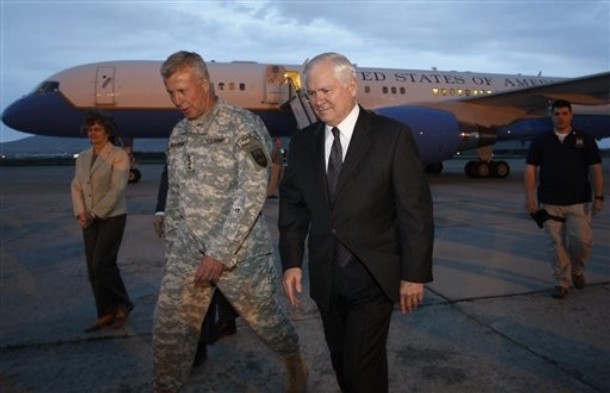 The United States is making a shocking shake-up in the leadership of the Afghanistan mission, replacing General David McKiernan with Lt. General Stanley McChrystal. McKiernan has been in his post less than a year.
The United States is making a shocking shake-up in the leadership of the Afghanistan mission, replacing General David McKiernan with Lt. General Stanley McChrystal. McKiernan has been in his post less than a year.
This is very much a breaking story but my preliminary account is at New Atlanticist: “Afghanistan Commander Replaced.” A brief excerpt:
I don’t pretend to be privy to the inside details that Gates, Mullen and other decision-makers have. From my outside perch, however, this strikes me as both unfair and counterproductive. For one thing, based on McKiernan’s appearance here at the Atlantic Council [transcript here] and various statements in the press that I’ve read, the man very much understood that Afghanistan was a complex operation that couldn’t be won simply by shooting the bad guys. But the ISAF commander is in charge of the shooters, not the civilian operations.
Further, unless McKiernan was truly headed in the wrong direction — and I have no evidence that he was — it simply doesn’t make sense to change horses at this juncture. while McChrystal is by all accounts a rising star and likely to be superb at this assignment, another change in command is another period of adjustment at a critical period.
Amusing, if nothing else:
Adding intrigue to this development is that it comes only three days after a WSJ report by Peter Spiegel that, “Last month, the chairman of the Joint Chiefs of Staff, Adm. Mike Mullen, quietly assigned his top staff officer, Lt. Gen. Stanley McChrystal, to head the task force with the aim of improving the effectiveness of the Afghan strategy. Such strategic planning is usually left to commanders in the region.” I’m reminded of George W. Bush’s appointing Dick Cheney to head up his vice presidential search committee in 2000 only to decide that he was looking for a man a whole lot like Dick Cheney.
I’ll be very interested to see what additional details develop.
UPDATE (Dave Schuler)
This is only the wildest speculation but I can’t help but wonder if this is a signal that there are limits to how large a build-up of forces in Afghanistan will be tolerated. “A conventional approach” on the part of Gen. McKiernan, the nominal reason for the change in personnel, may be code for a massive increase of troops.

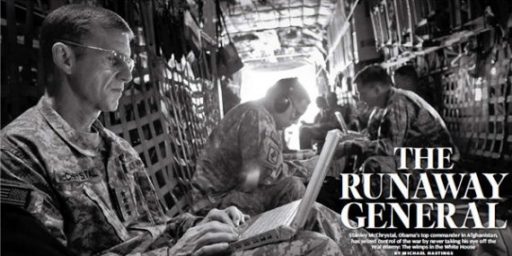
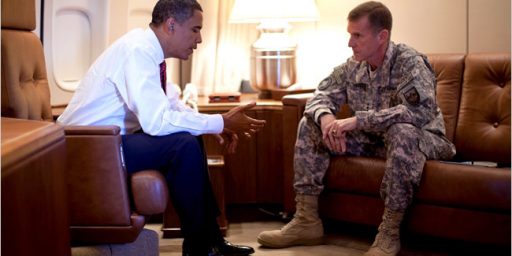

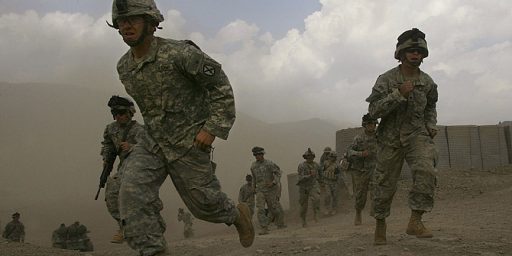
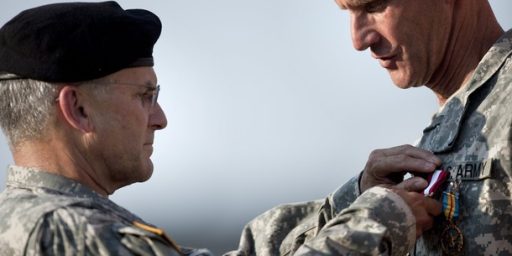
I don’t know, maybe it’s just be signalling. I’ve no doubt that General McKiernan is as you say. But this, I think, is the telling point: “McKiernan has been in his post less than a year.”
That’s to say, he took command during the Bush Administration. The new administration wants it to be known that it’s going about Afghanistan in a different way than the previous. Installing a new commander would be part of that, I suppose. And there were differences over strategy, I gather.
And, BTW, the stragegy differences, as I read it, remind me somewhat of this:
The U.S. Marine Corps Combined Action Program (CAP): A Proposed Alternative Strategy for the Vietnam War.
When I work under Gen. McKiernan, he seemed like a top notch General. McChrystal has more SOF experience so maybe they are trying to go even more in that direction, although there are concerns in doing so. One problem with SOF operations is too many people get their information about them from Hollywood and don’t understand the real world.